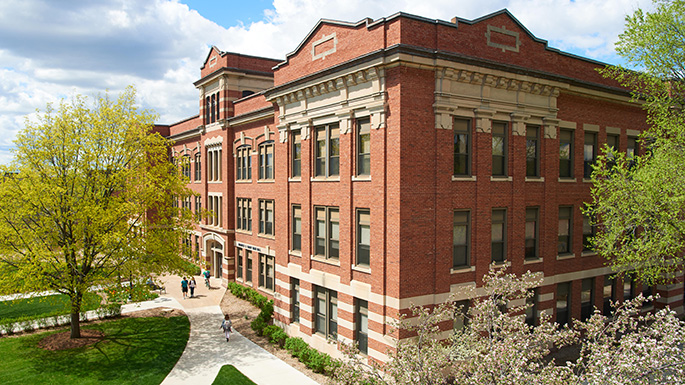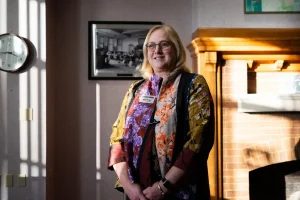The tenure process for UWL professors
April 21, 2019
Many University of Wisconsin-La Crosse students have heard the term “tenure” but still do not know what it means and how it applies to them and their professors. The common belief is that the tenure system is in effect so that professors can’t get fired, and many claim that it is job insurance for life. This philosophy differs based on who you speak to at UWL.
“The importance of tenure historically has been the protection of academic freedom of faculty,” said Betsy Morgan, Provost and Vice Chancellor at UWL. “Notably, the idea of teaching topics but pursuing scholarship on topics that might make anybody grumpy about what you’re doing.”
An Assistant Professor at UWL, who asked to remain anonymous will be referred to as *Professor Smith. Smith also commented on the importance of tenure from their perspective as an un-tenured member of UWL.
Smith explained that tenure’s main goal is to promote research and allow academics to pursue questions and answers surrounding topics that may be socially unacceptable. This could include marginalized groups, politically charged research, or other controversial topics.
Smith said that the results of the research shouldn’t be influenced by the institution the researcher belongs to, which is where tenure comes in. Tenure also gives faculty the space to speak up with opinions that might be at odds with administration without retribution. Tenure does provide job security, but in order to protect academic and professional freedom.
Tenure does not mean that a professor is immune from termination if there is professional or social misconduct. “[Tenure means] that you have a secure job unless you really screw up,” said Morgan. “It’s not that you couldn’t ever be separated from the University, but it does protect you in the sense of your teaching and scholarship and service.”
Smith outlined four possible reasons for a tenured professor being “separated from the University,” incompetence, or not being able to perform professional duties, negligence, or being able to perform duties but choosing not to, misconduct, which could include plagiarism or harassment, or financial exigency, meaning the University is financially unable to retain the professor.
One of the problems with tenure, Smith explained, “is that the process is extremely opaque and subjective.” Each department has different processes in terms of reviewing and recommending a professor for tenure, and the expectations are not always clear.
“All faculty are reviewed on teaching, scholarship, and service,” said Morgan. “Because we’re a teaching institution, teaching is our primary focus.”
There aren’t any specific requirements in terms of what a professor has to do in terms of scholarship (research, publishing articles, etc.) or service (working on UWL committees).
Other times, a tenure candidate does less than expected. Additionally, faculty members go through a heavy review process, in which they are reviewed by their department, their dean, and then by the provost.
In the case of the peer reviews done by the department, each department has a different process. In some departments, the reviews are done anonymously, meaning that a peer could give a tenure candidate a negative review without having to back it up.
Morgan offers a different take on departmental peer review. “Occasionally, I think that because a lot of the decision making, a lot of the peer review, is done by your peers, that’s who should be doing it, but it’s also true that sometimes peers won’t be as direct as they should be when there is a concern. I don’t know if that’s more true in tenure than it is in any organization,” said Morgan.
Additionally, Smith said that the main problem with tenure is that the decisions of it predominately disadvantage marginalized faculty members, including women, faculty members of color, faculty members who identify as LGBTQ+, or fat faculty members.
Smith said that it is easier for a “white, straight male to attain tenure than a minority faculty member,” not just at UWL, but in society in general.
Part of this is because there is more expected of minority faculty members. Smith said minority faculty members “do a lot of unacknowledged labor.”
“There are fewer people of color in institutions such as Universities (including UWL), meaning they have extra roles. For example, students of color reach out to faculty members of color for mentorship and guidance, meaning that the faculty member has additional advisees and the emotional labor of working with marginalized students,” said Smith.
Morgan agreed with this point. “We know that in student evaluations there is some systematic bias. I think that you can have pockets of the University where depending on the type of scholarship someone does, it may or may not be appreciated, and that might be more true for marginalized faculty,” said Morgan. “What most of the research suggests is not so much direct bias in the process, but that the demands of faculty of color is stronger.”
“I can tell you that, in terms of our own numbers here at UWL, we don’t have a concern that faculty of color aren’t retained at the same rate,” said Morgan. “Now, having said that, we have more faculty of color leave us. But I don’t think that’s over concerns about not being retained, I think that’s more about the climate of the campus, the climate of the overall community.”
Both Morgan and Smith said that tenure is going away, mostly due to lack of funding. According to Morgan, there are fewer tenure-track positions nationally available. They both believe that tenure is necessary.
Smith said that tenure “protects greater knowledge.”
“It isn’t a perfect system and needs some changes in order to benefit faculty, but the tenure system is vital to keeping Universities as places of learning and research. Although tenure decisions can often be discriminatory, I think UWL has a better track record, from what I have heard, compared to other institutions, specifically larger institutions, but they could get better in reference to the systematic issues of the process.” said Smith.
* This UWL professor’s name was changed due to them wishing to remain anonymous.
Show Global Grounds cashier this article for a FREE bagel with the purchase of a regular-priced drink! Limit one coupon per customer.







